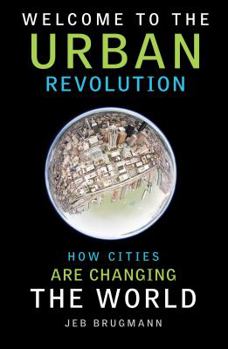Welcome to the Urban Revolution: How Cities Are Changing the World
Select Format
Select Condition 
Book Overview
A powerful reappraisal of the role of cities and their inhabitants in solving global problems, from a leading expert in urban development. In the second half of the twentieth century, revolutions... This description may be from another edition of this product.
Format:Hardcover
Language:English
ISBN:0670068055
ISBN13:9780670068050
Release Date:May 2009
Publisher:Viking
Length:352 Pages
Weight:1.35 lbs.
Related Subjects
Architecture Business & Finance City Planning & Urban Development Economics Humanities Political Science Politics & Government Politics & Social Sciences Public Policy Social Science Social Sciences Sociology Textbooks Urban Urban & Land Use Planning Urban & Regional Urban Planning & DevelopmentCustomer Reviews
4 ratings
Strategic Cities as an Outgrowth of Community - Comparing Global Cities
Published by Thriftbooks.com User , 13 years ago
As an architect, I had the pleasure of meeting Jeb Brugmann this spring at a ULI meeting in Kansas City and then read his brilliant book. His theory: the best cities emerge from a way of life more than a system of speculative land development, that is, from "strong traditions of urbanism". In good examples, a city or community has a unique sense of who it is, its problems, and the best solutions. They tinker with development as an outgrowth of community, the "chaotic complexities," rather than impose master plans for the sake of development. In particular, his typology of cities appealed to me: Crisis Cities (which have competing purposes), Great Opportunity Cities (incoherent growth), and the best ones -Strategic Cities. By working at conceptual and particular levels simultaneously, he effectively contrasts planned cities versus ad hoc cities. In many ways, this approach parallels a triple bottom line method that considers social, economic, and environmental purposes. Brugmann bounces around the globe from Mumbai to Chicago and sees systematic answers, or as he calls them, citysystems or ecosystems. here's an interview with Brugmann that summarizes many of the ideas in the book. [...]
Some serious thinking about the future of cities
Published by Thriftbooks.com User , 13 years ago
Jeb Brugmann has researched the growth, and sometimes decline, of cities throughout the world, from him native Toronto through Chicago and Detroit, then on to Curitiba, Brazil and a squatter city adjacent to Mumbai, India. He is a "fan," to use an imprecise word, of the future of cities. He touts a plan-based urbanism, but one that reflects native strengths of individual cities and metropolitan areas, contrary to a New Urbanism that may be formulaic at times. He acknowledges the need to address energy use and other issues of urban areas, while adding that the world is going to continue to urbanize, planning or no. The one disagreement I had with him was his claim that urbanization will lead naturally to democracy. The verdict is still out on China, to be sure. It's iffy on other countries that may move in the direction of oligarchy. As for the past, whether or not urbanism contributed to the fall of the Iron Curtain, Hitlerite Germany was an already-urbanized nation.
This book is highly researched and offering depth to the issues of urbanizaiton
Published by Thriftbooks.com User , 14 years ago
This is a pretty comprehensive book impeccably researched offering insight and depth to the problems associated with urbanization. The wide ranching narrative covers a lot of worthy ground offering clear visionary praxis of the development of cities. Jeb touches on crime, development, use of space, competing interests, corruption, politics, and slums. It is both a macro, and micro analysis of every issue that concerns the rise or fall of cities. Included in the debate are cities getting it right: in other words, visionary planning that seems to keep in check the negative forces of the corrupt body politic. Another visionary idea carried forward by the author is that he posits a linkage between globalization and urbanization and what that means for all of us. He clearly understands the problems, and offers some keen solutions for moving beyond them. The only downside of the book in my opinion was his superficial understanding of sustainability issues and clear lack of blending eco-urban solutions into the overall scope of the book.
A Champion of Urbanism
Published by Thriftbooks.com User , 15 years ago
Jeb was part of a discussion panel along with Richard Florida, Roger Martin and David Miller (The Mayor of Toronto). I was impressed by his experience and clarity - even when compared against these other high calibre communicators. Jeb's book is new territory for me. I have not read any others on city planning and urbanism and regard myself as a granola-crunching anti-urbanite. Yet it made me realize just how urban I am - along with over half the population of the world. Whenever I travel I gravitate to the cities; when in Argentina I don't go to the Iguazu Falls but stay in Buenos Aires, when in Cuba I get bored at the beach but appreciate Havana. That is because cities are concentrations of human interest and they are stimulating. This book is a celebration of urbanism and it reads like the cities it describes; rich in anecdote, busy, enthusiastic, provocative and multi-faceted. Who should read it? City planners, architects, politicians, business people, educators... and anyone who loves (or hates) cities and wants to learn about the biggest mass migration of humanity in history.




